#philosophical discourse
Explore tagged Tumblr posts
Text
Delving into Poetic Wisdom: A Review of "On the Art of Poetry" by Aristotle
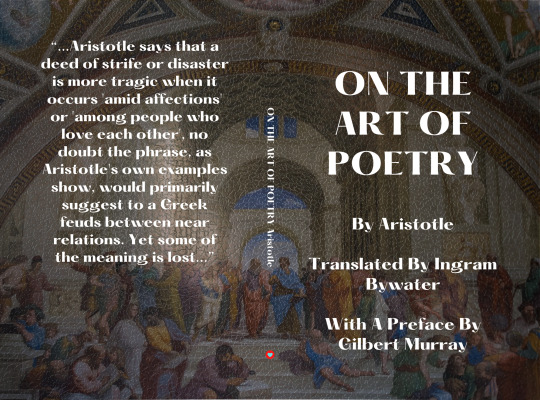
Aristotle's "On the Art of Poetry," translated by Ingram Bywater, stands as a seminal work in literary criticism, offering profound insights into the nature and function of poetry that continue to resonate with readers and scholars alike. Written in the 4th century BCE, this treatise serves as a comprehensive examination of the principles and techniques that underlie the creation of poetry, providing valuable guidance for poets and readers alike.
At its core, "On the Art of Poetry" is a testament to Aristotle's keen intellect and analytical prowess. In this work, Aristotle explores the various elements that contribute to the effectiveness of poetry, including plot, character, diction, and spectacle. Through his systematic analysis, Aristotle seeks to uncover the universal principles that govern the art of poetry, shedding light on its essential nature and its role in human society.
One of the most compelling aspects of "On the Art of Poetry" is Aristotle's emphasis on the importance of mimesis, or imitation, in poetry. According to Aristotle, poetry is a form of imitation that seeks to represent the actions, emotions, and experiences of human life. Through the skillful use of language and imagery, poets are able to create a vivid and lifelike portrayal of the world, inviting readers to engage with their work on a profound emotional and intellectual level.
Moreover, "On the Art of Poetry" offers valuable insights into the principles of dramatic structure and the role of catharsis in tragedy. Aristotle argues that tragedy is a form of poetry that evokes feelings of pity and fear in the audience, leading to a purgation or cleansing of these emotions. Through the depiction of the fall of a tragic hero, tragedy allows audiences to confront their own mortality and the fragility of human existence, ultimately leading to a deeper understanding of the human condition.
In addition to its exploration of tragedy, "On the Art of Poetry" also examines the principles of comedy and epic poetry, providing valuable guidance for poets working in these genres. Aristotle discusses the importance of unity of plot, character, and theme in epic poetry, as well as the role of humor and satire in comedy. Through his analysis, Aristotle highlights the diversity of poetic forms and the unique challenges and opportunities that each genre presents to the poet.
In conclusion, "On the Art of Poetry" by Aristotle is a timeless classic that continues to inspire and enlighten readers with its profound insights into the nature of poetry. Aristotle's systematic approach to literary criticism, coupled with his keen observations and analytical rigor, make this work an indispensable resource for anyone interested in the art of poetry. With its timeless wisdom and enduring relevance, "On the Art of Poetry" remains a cornerstone of literary theory and a testament to the enduring power of poetic expression.
Aristotle's "On the Art of Poetry," is available in Amazon in paperback 12.99$ and hardcover 18.99$ editions.
Number of pages: 116
Language: English
Rating: 10/10
Link of the book!
Review By: King's Cat
#Aristotle#Poetry#Literary criticism#Mimesis#Imitation#Dramatic structure#Tragedy#Catharsis#Comedy#Epic poetry#Unity of plot#Characterization#Diction#Spectacle#Poetics#Aesthetic principles#Greek literature#Philosophical discourse#Aristotle's theory#Literary analysis#Poetic form#Emotion#Human experience#Morality#Ethics#Aesthetics#Universal principles#Literary genres#Rhetoric#Imagination
3 notes
·
View notes
Text
Delving into Poetic Wisdom: A Review of "On the Art of Poetry" by Aristotle
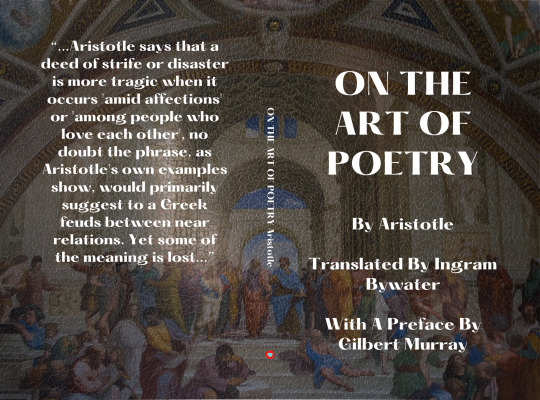
Aristotle's "On the Art of Poetry," translated by Ingram Bywater, stands as a seminal work in literary criticism, offering profound insights into the nature and function of poetry that continue to resonate with readers and scholars alike. Written in the 4th century BCE, this treatise serves as a comprehensive examination of the principles and techniques that underlie the creation of poetry, providing valuable guidance for poets and readers alike.
At its core, "On the Art of Poetry" is a testament to Aristotle's keen intellect and analytical prowess. In this work, Aristotle explores the various elements that contribute to the effectiveness of poetry, including plot, character, diction, and spectacle. Through his systematic analysis, Aristotle seeks to uncover the universal principles that govern the art of poetry, shedding light on its essential nature and its role in human society.
One of the most compelling aspects of "On the Art of Poetry" is Aristotle's emphasis on the importance of mimesis, or imitation, in poetry. According to Aristotle, poetry is a form of imitation that seeks to represent the actions, emotions, and experiences of human life. Through the skillful use of language and imagery, poets are able to create a vivid and lifelike portrayal of the world, inviting readers to engage with their work on a profound emotional and intellectual level.
Moreover, "On the Art of Poetry" offers valuable insights into the principles of dramatic structure and the role of catharsis in tragedy. Aristotle argues that tragedy is a form of poetry that evokes feelings of pity and fear in the audience, leading to a purgation or cleansing of these emotions. Through the depiction of the fall of a tragic hero, tragedy allows audiences to confront their own mortality and the fragility of human existence, ultimately leading to a deeper understanding of the human condition.
In addition to its exploration of tragedy, "On the Art of Poetry" also examines the principles of comedy and epic poetry, providing valuable guidance for poets working in these genres. Aristotle discusses the importance of unity of plot, character, and theme in epic poetry, as well as the role of humor and satire in comedy. Through his analysis, Aristotle highlights the diversity of poetic forms and the unique challenges and opportunities that each genre presents to the poet.
In conclusion, "On the Art of Poetry" by Aristotle is a timeless classic that continues to inspire and enlighten readers with its profound insights into the nature of poetry. Aristotle's systematic approach to literary criticism, coupled with his keen observations and analytical rigor, make this work an indispensable resource for anyone interested in the art of poetry. With its timeless wisdom and enduring relevance, "On the Art of Poetry" remains a cornerstone of literary theory and a testament to the enduring power of poetic expression.
Aristotle's "On the Art of Poetry," is available in Amazon in paperback 12.99$ and hardcover 18.99$ editions.
Number of pages: 116
Language: English
Rating: 10/10
Link of the book!
Review By: King's Cat
#Dramatic structure#Tragedy#Catharsis#Comedy#Epic poetry#Unity of plot#Characterization#Diction#Spectacle#Poetics#Aesthetic principles#Greek literature#Philosophical discourse#Aristotle's theory#Literary analysis#Poetic form#Emotion#Human experience#Morality#Ethics#Aesthetics#Universal principles#Literary genres#Rhetoric#Imagination
1 note
·
View note
Text
Absolute Monism
Singularity is the same as MultiplicityIn the vast expanse of philosophical discourse, few concepts challenge the contours of human understanding as the idea of Absolute Monism. At its core, it posits that everything is essentially a unified, singular reality, but herein lies a paradox: If all is One, how does one account for the seemingly infinite multiplicity that populates our universe? The…

View On WordPress
#absolute monism#Big Bang#cosmic singularity#cosmic story#cyclical existence#duality paradox#finite#hologram#human perception#illusion of separation#infinity#Interconnectedness#multiplicity#philosophical discourse#shared journey#Singularity#unified reality
0 notes
Text


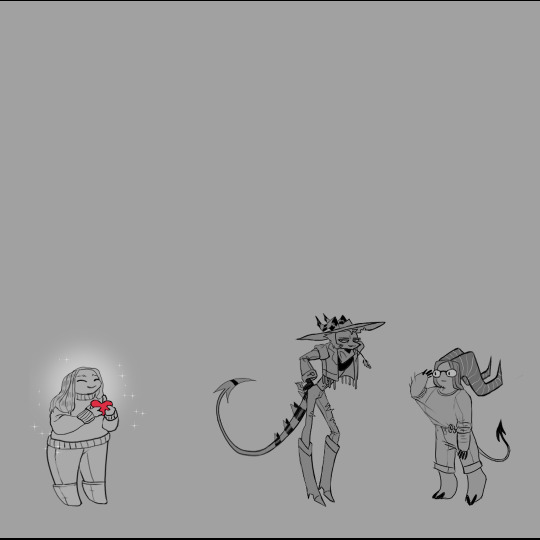
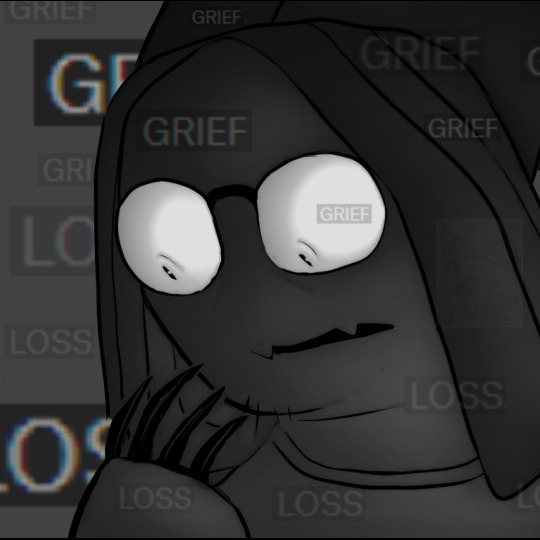
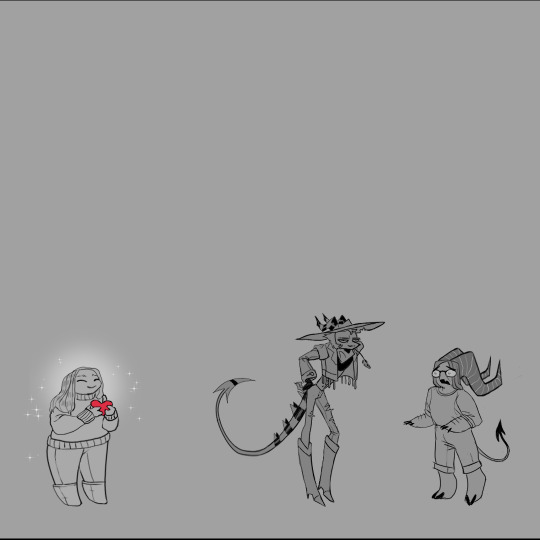
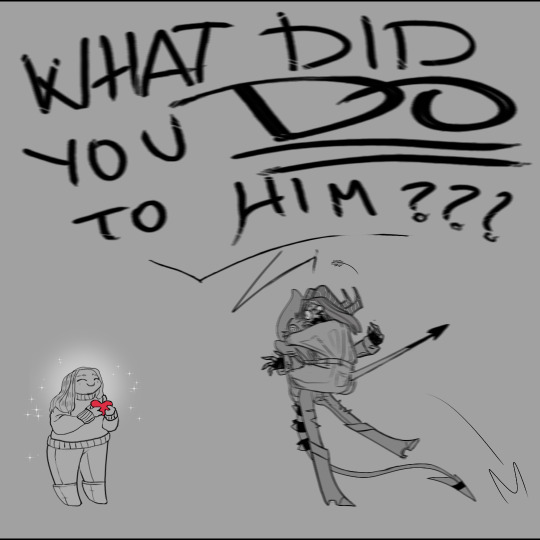
wink of god
#helluva boss#helluva striker#vivienne medrano#vivziepop#ngl i've long harbored the chewing suspicion that striker's backstory would be treated as a gag or punchline#yet this one brush of deific finger over surface waters of ever-brewing striker aficionado community discourse#( discourse like what the greek philosophers had in their there forums )#has dispelled such worries#oh we will get that tragic backstory#and it's gonna fucking tear going in
181 notes
·
View notes
Text
I'm sorry for so much inactivity throughout the months- I have actually not felt very proud of my identity in a while, and it's a just become a less major part of me. I still identify the same but because of events in my life I haven't been inclined to celebrate it, and discussions surrounding these sorts of things are just not a huge thing in my life anymore. I had experienced major loss and had been going through it when I made this blog, I guess it slowly changed that part of me that felt open and proud of my orientation. I had been going more and more back into the closet at school. I've given up on a lot of things as time passes because I've lost energy for a lot of my hobbies and interests. maybe this will change if my life improves, but this is just how it's been. I'll still reblog posts occasionally for now but currently I just don't have the mental space to make in depth posts or discuss these things
#I still very actively engage with queer issues especially trans issues on my main#but that's more because it's about tangible activism for others than pride#I can talk about the ways people are oppressed and sometimes talk about how I am but#im just not. that self expressive or self accepting anymore#I think others deserve to be but im just not#I've also grown exhausted of petty microlabel infighting discourse#my focus has been more on systemic oppression and political and philosophical theory#parts of that have shown up in my posts before#but yeah#update#lesboy
27 notes
·
View notes
Text
unironically, dealing with like... casual transmisogyny is the most exhausting thing. I see a post on instagram, the first slide says "trans erotica" and I think "awesome, I wonder what's in it?" As I go through the slides I notice... huh these first couple are all transmasc erotica, well maybe the last few will be transfem. So I keep scrolling, and while it doesn't specify if the books have transmasc or transfem characters, there are tags for the relationships and they're all fucking Ms. "MM relationship" "MMM polycule" and I get to the end and there's not a single one that has a transfem character. I go to leave a comment like "hey please put 'transmasc' instead of 'trans' so people know what you're talking about. But I check the description first because that's polite. They've already added a section in the description (at the very bottom) saying next time they'll be clearer. "Title slide should definitely say transMASC erotica! I will makes this more clear in future versions, as trans women and femmes are too often neglected in discussions of trans literature [double heart emoji] (added 7/8/2024)"
Remake the post? I'm not kidding. If other transfems see this post, get excited and then scroll through the whole thing and then go to the comments, enough that the poster was made aware of the mix up, then it's going to push this post in the algorithm. This person is benefitting from misleading people, and they are aware of it. But fixing it is just too much work. And like... okay fine I get that it's a little exhausting to re-edit the image and then takedown and reupload the post. But when I went to their account to take a poke around I saw they made a part II to their trans erotica post.
I thought "oh cool they didn't change the first image, maybe they've included transfem erotica now!" Second sentence of the first paragraph of description: "Offering up transmasc erotica collection PART TWO bc I've been staying fed recently [trans flag][black heart][bow][smiling devil face]" Which at least personally I found really frustrating to read. They used the exact same graphic for the first slide as they used in part I, again implying that there would be trans people in general. I went through the books, there's two amab enbies, both of which are side characters it seems one of which is the devil So yeah, horray, you included tranfems. But the focus is still clearly on transmasc characters. But to be fair, it was posted before the edit to part I's description was added. But also even though part II was posted before that edit, it doesn't have an edit of it's own. Probably because there's plausible deniability in the form of the amab enby characters, so they can claim that all trans people are included. Despite it being two characters in ten books, neither of which are a trans woman. It's the sort of fake, tokenizing inclusion that really starts to get under my skin and pour sand in my joints.
I went through all the posts they've made since part II, I'd go through all the ones since part I but I don't have that kind of time and frankly this is fucking exhausting. Every book they talk about, sans the two featuring amab enbies mentioned earlier, is about transmasc characters. In both erotica and other genres, that's all this person offers. It's also really telling when they make a post about "trans enby & gender queer book accounts of follow", where I would assume that they might shout out a transfem account that focuses on that side of erotica, and from what I can tell every single account of the nine they shout out is transmasc.
People in real life: "hey dude what's up?"
Yeah yeah reality check whatever. Okay so is this account in and of itself a problem? No, a 800 follower instagram account that talks about books does not a cause for alarm make. Is this indicative of a wider spread issue in the queer community? Yeah actually, the exclusion (intentional or not) of transfem stories and creators from the community starts with what individual people are engaging with. If all you read is transmasc books, and all you talk to are transmasc people then you're going to have issues when trans people aren't that. I'm not trying to attack this account, I didn't include their username very intentionally. I'm just using them as an instance of a specific brand of transmisogyny that I see a lot and find fucking exhausting, that being extremely trans positive accounts that only ever talk about transmascs. I don't know where I'm going with this. I didn't really have a plan.
There's an aversion to trans women. For a variety of reasons society hates us. People who have an easier time integrating with society at large tend to overlook that, and instead often adopt some of those aversions subconsciously. They're not going to mistreat you in public, or do anything obvious, they've got manners, but they're not gonna read books about you, or shout you out. It sucks because I feel like a crazy person pointing it out. I didn't talk about it for years because I thought people would think I'm weird, but discussions of transmisogyny on tumblr have opened my eyes to the fact that I'm not alone, that other people also see this, and that it's an actual problem.
Thanks sisters. It sucks on this boat, but at least it's crewed.
#transmisogyny#transmisogyny tw#transmisogyny discourse#I was scrolling instagram which watching Hbomberguy's plagiarism video and then saw something to complain about#then I did that Hbomberguy thing where I go waaaayyy too far in and get distracted and then try to wrap it up with something philosophical#I'm method acting hbomberguy help#revving the engine#also wow complaining about something and then having an epiphany about an aspect of racism that I couldn't wrap my head around#is really interesting and also makes me feel like a piece of shit. anyway I'm gonna talk about that later once I've digested my thoughts#harry dubois style. idk I haven't played disco elysium#wow that's a lot of tags on this post oh well I'm talkative today
38 notes
·
View notes
Text

FLOSTRE [to the audience]: What you're all asking yourselves is "Can he juggle?"
SOCRATES: No it's not. What we're all asking ourselves is "When will the dancing girls come on?"
FLOSTRE [ignoring Socrates, as he is only a ventriloquist's dummy]: Does this answer your question?
[Reaching behind him, Flostre pulls out no fewer than five logical propositions and hurls them one after the other into his mind. The audience gasps in amazement as he formalises, normalises, simplifies and reduces their terms, shifts quantifiers and deftly applies syllogisms, faster than wits could follow.]
MASTER OF CEREMONIES [at side of stage]: He makes it look easy, doesn't he, folks?"
[The philosopher keeps the propositions flying in coruscating arcs of reason and argument. To enthusiastic general applause he lays each one down in a chain of reasoning, from premises to the conclusion that had been implicit all along.]
MASTER OF CEREMONIES: What a philosopher!
SOCRATES: What a bore!

#Novelties and notions#writing#writers on tumblr#emil flostre#philosopher#stand up philosopher#mathematical manipulations#logical propositions#can he juggle#magic realism#logic#where are the dancing girls?#whimsicore#whimsy#humor#reason and argument#fiction#metafictional discourse#metafiction#vaudeville#original content#original writing#writeblr
8 notes
·
View notes
Text
you'd think that after the nightmare circus that was the (social) media treatment of amber heard, people would learn to become a tad more skeptical when there are suddenly thousands of posts, videos, articles, etc. tarring and feathering another woman in the spotlight. silly me! i forgot this is a bone you can wave in front of the dog forever, because many people still view women as vicious caricatures by default, and not real human beings.
#(and these are comparatively powerful and wealthy white women from the US#[i don't say this to trivialize what they've been through but just for a scale perspective]#when it comes to the millions of other times some iteration of this story has happened to any marginalized woman#the public at large will never even hear of what has been done to her let alone her own perspective on the matter.)#i'm not saying anything new here. but it's just depressing to see this happen over. and over. and over again.#yet the majority of heavily funded and algorithm pushed discourse (that i see at least) regarding the major problem at play#is centering the happiness and comfort of men and philosophizing on bringing them back into the fold.#they're not even missing the forest for the trees at this point. it's zeroing in on a single tree branch while the forest is on fire#[making my own post to not be annoying in someone else's tags]
7 notes
·
View notes
Text
in my perfect world everyone makes so many lesbian muses the men then have to deal with the exact same behavior when every single post ever written isn’t about dick.
#CLAWS RETRACTED.#[real talk: I’m a lesbian transmasc little enby guy. but my gender? is lesbian. it’s how I explain it. my attraction to women is a part of#my innate gender. that’s just how it is and the two things inform one another. heteronormativity is still so alive and now everyone can put#it under progressive little labels where the character is bisexual but everything that’s focused on for miles is the hetcoded shit. it’s a#cool little thing people do now. it went from when I was a kid and ‘there’s no such thing as bi you’re just confused’ to ‘everyone is bi#because it gives me points but I will never meaningfully observe the queer aspect of that identity and it can make me seem comfortable with#queer identities’. it’s lip service so much of the time. and I never ever ever say you’re only valid if you write bi characters in a#queercoded relationship. bisexuality is forever valid always even if you’ve NEVER been in a queer relationship. but this is writing and#real bisexual people (I’m not even bi I’m literally a lesbian) have experiences irl that make them feel shitty#when they see them boiled down to shallow. a lot in the same way I get upset when I see lesbian relationships brushed off or ignored in#spite of my own excitement toward the ship. MY POINT IS that lesbians are completely ignored by this point and I can say this both irl and#on here because when you live a life that excludes men from your romantic space you’re basically illegal. it drives me fucking insane. the#way anyone can make a fucking whitebread ass man on this site and their inbox will be exploding but you make a lesbian and you have to pad#quietly around because from jump you’re already worried about how people will perceive you and you KNOW they won’t be immediately welcoming.#this is an irl thing in such a big way and I’m a NEW YORKER. but the fact that this exists in the rpc? truly I miss when we just wrote and#enjoyed things and this wasn’t a cesspit of discourse instead of an actual creative community. like. I went to college to study boring#theses that couldn’t keep my attention. I slogged through litcrit theory. do I love it? yes. but some of yall really just wanna be on#debatebro YouTube and not in the actual rpc. it’s wild. everyone’s a philosopher but no one wants to meaningfully engage. and if they do#they want to in either bad faith or basically hardheaded ignorance about an issue. someone’s 2 seconds from rping destiny.#swear to fucking god if I see one person make an asm.ngold joke I will cry.]
9 notes
·
View notes
Text
A Review of "The Eleusinian and Bacchic Mysteries" by Thomas Taylor
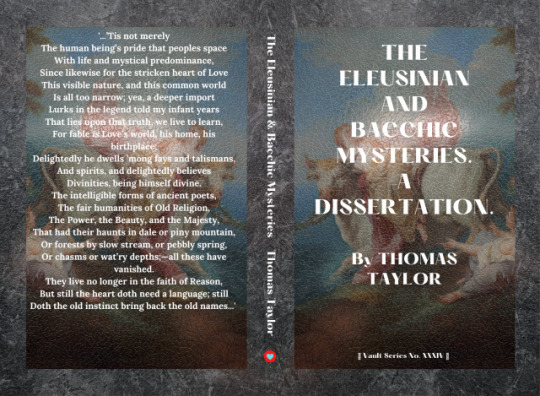
"The Eleusinian and Bacchic Mysteries" is an illuminating journey into the heart of ancient Greek religious practices, meticulously explored and vividly presented by the renowned philosopher and translator, Thomas Taylor. This dissertation, complemented by the evocative illustrations of A. L. Rawson, takes readers on a profound exploration of the mystical rituals that shaped the spiritual landscape of ancient Greece.
Thomas Taylor's scholarly expertise in Neoplatonism and his unwavering dedication to preserving the wisdom of the past shine brilliantly in this work. Through his meticulous translation and commentary, Taylor unveils the enigmatic rites and ceremonies of the Eleusinian and Bacchic Mysteries, providing readers with a window into the spiritual world of ancient Greece.
One of the most remarkable aspects of Taylor's work is his ability to convey the deep spiritual significance of these ancient rituals. He delves into the symbolism, mythology, and metaphysical underpinnings of the Mysteries, revealing how they were designed to facilitate personal transformation and spiritual enlightenment. Taylor's profound insights into the mysteries' inner workings give readers a profound understanding of their purpose and significance.
The accompanying illustrations by A. L. Rawson add another layer of richness to this dissertation. Rawson's artistry brings to life the mystical and mythological elements of the rituals, making the ancient world tangible and captivating. These illustrations serve as a visual guide, enhancing the reader's comprehension and engagement with the material.
"The Eleusinian and Bacchic Mysteries" is not merely a historical account but a spiritual odyssey. It invites readers to contemplate the enduring relevance of these ancient practices in the modern world. Taylor's work inspires us to reflect on the importance of initiation, transformation, and the quest for spiritual truth.
In conclusion, "The Eleusinian and Bacchic Mysteries" is a masterpiece of scholarship and spiritual insight. Thomas Taylor's dedication to preserving the wisdom of antiquity and his ability to convey its profound significance make this dissertation an invaluable resource for anyone interested in the spiritual and mystical traditions of ancient Greece. A. L. Rawson's illustrations add a visually captivating dimension to this already enlightening work. It is a must-read for seekers of wisdom, scholars, and those fascinated by the mysteries of the past.
"The Eleusinian and Bacchic Mysteries" by Thomas Taylor is available in Amazon in paperback 13.99$ and hardcover 19.99$ editions.
Length of the Book: 184 pages
Language: English
Rating 8/10
Link of the book!
Review by King's Cat
#Ancient Greek Mysteries#Eleusinian Mysteries#Bacchic Mysteries#Neoplatonism#Spiritual Enlightenment#Rituals and Ceremonies#Symbolism and Mythology#Spiritual Transformation#Thomas Taylor#A. L. Rawson#Ancient Greek Religion#Mystical Traditions#Spiritual Wisdom#Initiation#Metaphysical Insights#Illustrations of Ancient Rituals#Philosophical Discourse#Esoteric Knowledge#Spiritual Quest#Historical Dissertation
3 notes
·
View notes
Text
A Review of "The Eleusinian and Bacchic Mysteries" by Thomas Taylor
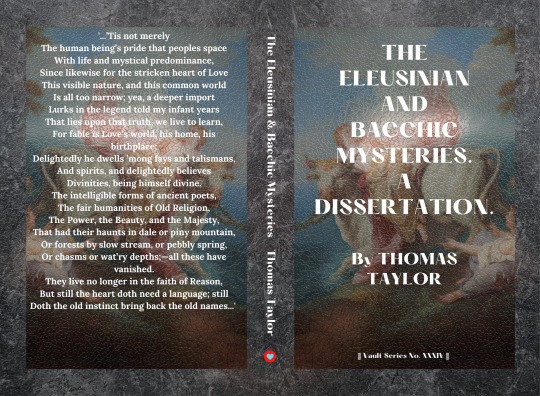
"The Eleusinian and Bacchic Mysteries" is an illuminating journey into the heart of ancient Greek religious practices, meticulously explored and vividly presented by the renowned philosopher and translator, Thomas Taylor. This dissertation, complemented by the evocative illustrations of A. L. Rawson, takes readers on a profound exploration of the mystical rituals that shaped the spiritual landscape of ancient Greece.
Thomas Taylor's scholarly expertise in Neoplatonism and his unwavering dedication to preserving the wisdom of the past shine brilliantly in this work. Through his meticulous translation and commentary, Taylor unveils the enigmatic rites and ceremonies of the Eleusinian and Bacchic Mysteries, providing readers with a window into the spiritual world of ancient Greece.
One of the most remarkable aspects of Taylor's work is his ability to convey the deep spiritual significance of these ancient rituals. He delves into the symbolism, mythology, and metaphysical underpinnings of the Mysteries, revealing how they were designed to facilitate personal transformation and spiritual enlightenment. Taylor's profound insights into the mysteries' inner workings give readers a profound understanding of their purpose and significance.
The accompanying illustrations by A. L. Rawson add another layer of richness to this dissertation. Rawson's artistry brings to life the mystical and mythological elements of the rituals, making the ancient world tangible and captivating. These illustrations serve as a visual guide, enhancing the reader's comprehension and engagement with the material.
"The Eleusinian and Bacchic Mysteries" is not merely a historical account but a spiritual odyssey. It invites readers to contemplate the enduring relevance of these ancient practices in the modern world. Taylor's work inspires us to reflect on the importance of initiation, transformation, and the quest for spiritual truth.
In conclusion, "The Eleusinian and Bacchic Mysteries" is a masterpiece of scholarship and spiritual insight. Thomas Taylor's dedication to preserving the wisdom of antiquity and his ability to convey its profound significance make this dissertation an invaluable resource for anyone interested in the spiritual and mystical traditions of ancient Greece. A. L. Rawson's illustrations add a visually captivating dimension to this already enlightening work. It is a must-read for seekers of wisdom, scholars, and those fascinated by the mysteries of the past.
"The Eleusinian and Bacchic Mysteries" by Thomas Taylor is available in Amazon in paperback 13.99$ and hardcover 19.99$ editions.
Length of the Book: 184 pages
Language: English
Rating 8/10
Link of the book!
Review by King's Cat
#Ancient Greek Mysteries#Eleusinian Mysteries#Bacchic Mysteries#Neoplatonism#Spiritual Enlightenment#Rituals and Ceremonies#Symbolism and Mythology#Spiritual Transformation#Thomas Taylor#A. L. Rawson#Ancient Greek Religion#Mystical Traditions#Spiritual Wisdom#Initiation#Metaphysical Insights#Illustrations of Ancient Rituals#Philosophical Discourse#Esoteric Knowledge#Spiritual Quest#Historical Dissertation
0 notes
Text
I don't know if I should be worried for my own morals or if people experience love in a wildly different way, but if I were in Tel's or Penny's place, there isn't a SINGLE thing my loved one could have done to get back to me that would make me hate them. Nothing. And if I were in Ody's place, I would have fought with everything in me. Anything to at least give my loved ones closure. Anything to make sure they don't doubt even for a second that I love them with all my heart, my soul, my very essence.
#not tagging or using their names bc i don't want to be rude or start discourses#but I was a bit baffled when saw some ppl criticizing her for taking her husband back w no questions asked#or that he wasn't justified in the way he dealt with the men in the palace#mind you they were going to TORTURE his son and wife#not that you can't criticize their choices on a philosophical level of course#but I can't imagine looking at the people you love and not know it in your heart you'd do the impossível for them#sorry about the rambling I just couldn't stop thinking about this lmao
5 notes
·
View notes
Text
So I did philosophy at uni and was really interested in philosophy of mind and took several modules on it. And I saw a post calling something that definitely wasn’t mind body dualism. So this post is to say that you can recognise that a condition is a mental illness without subscribing to mind body dualism.
The belief that we have a mind isn’t on its own dualism. Dualism is the belief that the mind isn’t made of/ doesn’t arise from physical stuff or processes but instead is made of a separate “mental stuff”
You can recognise that we have subjective thoughts, behaviours and emotions and sense of self that arise out of physical processes in the brain (and beyond), and call those things a mind while not being a dualist.
You can call an illness that disrupts those physical processes in a way that causes (mainly) symptoms that affect those mental experiences (subjective thoughts, sense of self, behaviours and emotions) a mental illness without being a dualist.
You can definitely say “people with conditions which affect their mind (and have historically been called and are still called mental illness) have a different experience of ableism to people whose disabilities affect mainly non-mental parts of them (known as physical disabilities) which includes being called different slurs” without being a dualist.
On a side note it’s ridiculous to say “my movement disorder affects my brain and so does schizophrenia so I can call myself slurs related to psychosis” so “my mental illness impacts my brain which is physical so I can call myself cripple“ also doesn’t make sense
#cripplepunk discourse#mind body dualism#sorry for getting involved in this again#but dualism is a specific philosophical position#that isn’t just ‘the mind exists and some conditions predominantly affect this’
80 notes
·
View notes
Text


#decided to make a separate post just for this bastard because I like him#I read on the forgotten realms wiki that spectators are actually great philosophers#this one doesn't seem to be in the mood for discourse though#Baldur's Gate 3#BG3#Baldur's Gate 3 gifs#BG3 gifs#gif
13 notes
·
View notes
Text

🌿🌿🌿No man fears Caesar himself, but he fears death, banishment, deprivation of his property, prison, and disgrace. Nor does any man love Caesar, unless Caesar is a person of great merit, but he loves wealth, the office of tribune, praetor or consul. When we love, and hate, and fear these things, it must be that those who have the power over them must be our masters.”🌿🌿🌿
© Epictetus, “Discourses”.
#stoicism#stoic philosophy#ancient philosophy#stoic quotes#philosophy#ancient stoicism#stoic wisdom#epictetus#discourses#stoic insights#fear#caesar#hate#love#anicent wisdom#philosophy of stoicism#stoicism philosophy#stoic philosophers#daily stoic#stoic mindset#stoic
2 notes
·
View notes
Text
Profile in the Spectator ends "As with Sisyphus and his boulder, one must imagine Agnes Callard happy," after giving a brief overview/outline of what she calls a "philosophical life" (tl;dr perpetual inquiry, in a dialogic social mode; this also amounts, in many ways, to the pursuit of happiness). I think the journalist was just going for something that sounded snappy and philosophy-adjacent--a recognizable quote--which also gestured at, hm, what they felt to be the quixotic nature of Agnes' project. But it's Camus! I do absolutely see how the shape of her project and the terms in which she describes it for a popular audience might resemble the philosophy of the absurd, but she's talking about knowledge, not meaning, and the stakes are not at all the same. Agnes Callard is Not an existentialist lol
5 notes
·
View notes